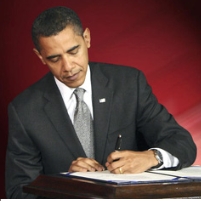Both Parties in House Slam Obama Signing Statement

Normally, if a U.S. president objects to a law passed by Congress, he vetoes it. But there is another mechanism that presidents claim allows them to ignore a certain section of a law if the president says he considers it unconstitutional or that it might “interfere with his ability to conduct foreign policy.” It’s called the “signing statement,” and a president may issue such a statement at the same time that he signs a bill or shortly thereafter. Although signing statements have been around for a long time, and most of them are innocuous, George W. Bush’s use of them brought signing statements into the realm of controversy because he used them to ignore a law that forbade torture and others that required transparency and congressional oversight of the activities of the Executive Branch.
- Top Stories
- Unusual News
- Where is the Money Going?
- Controversies
- U.S. and the World
- Appointments and Resignations
- Latest News
- Trump Renames National Football League National Trump League
- Trump to Stop Deportations If…
- Trump Denounces World Series
- What If China Invaded the United States?
- Donald Trump Has a Mental Health Problem and It Has a Name






Comments